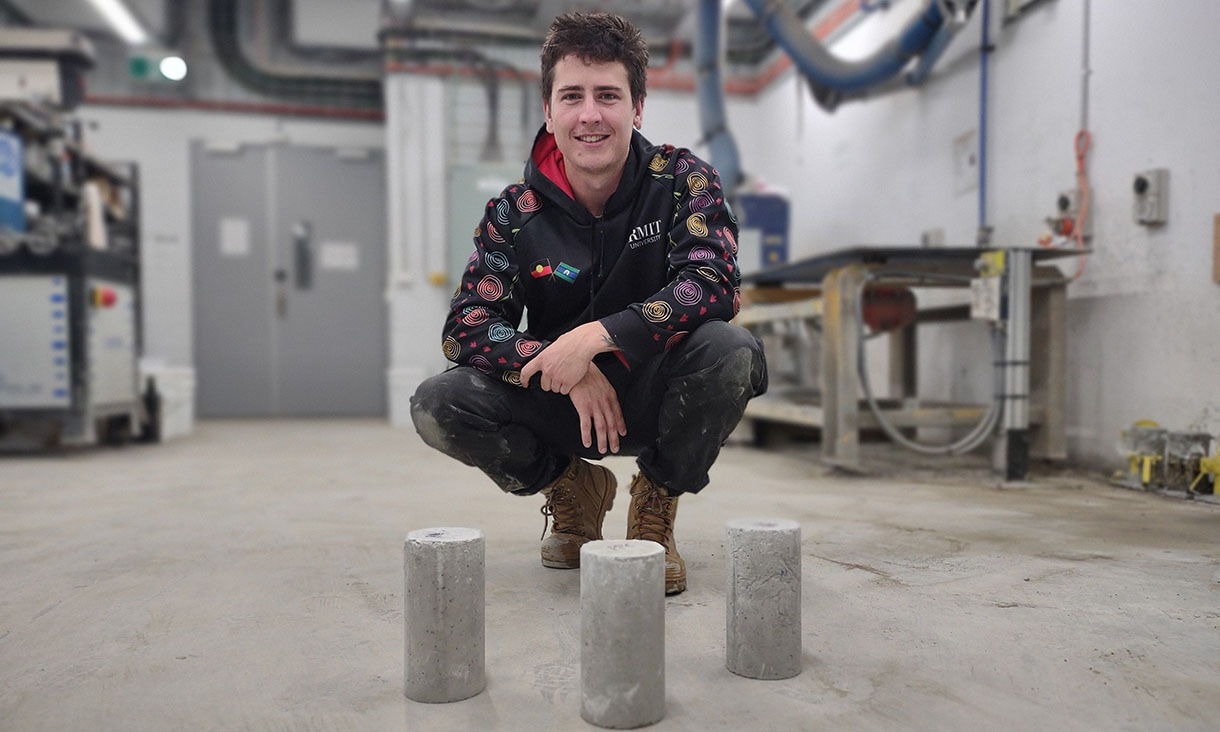RMIT University engineers have developed a method for using disposable personal protective equipment (PPE) to strengthen concrete, providing a creative option to dramatically minimize pandemic-generated waste.
 Vice-Chancellor’s Indigenous Pre-Doctoral Fellow at RMIT and co-researcher Shannon Kilmartin-Lynch with the team’s concrete that was made using PPE. Image Credit: RMIT University
Vice-Chancellor’s Indigenous Pre-Doctoral Fellow at RMIT and co-researcher Shannon Kilmartin-Lynch with the team’s concrete that was made using PPE. Image Credit: RMIT University
The RMIT team is the first to study the viability of recycling three forms of PPE into concrete: isolation gowns, face masks, and rubber gloves.
The investigations by RMIT School of Engineering researchers, published in the journals Case Studies in Construction Materials, Science of the Total Environment, and Journal of Cleaner Production, reveal the potential for PPE to be employed as reinforcement materials in structural concrete.
According to the tests, shredded PPE can raise the concrete’s strength by up to 22% and increase crack resistance.
Casafico Pty Ltd, an industrial partner of the RMIT School of Engineering team, intends to implement the research findings in a field project.
Every day since the commencement of the COVID-19 pandemic, an estimated 54,000 tons of PPE waste has been generated globally. Every month, around 129 billion disposable face masks are used and thrown worldwide.
According to the study’s first author, Ph.D. researcher Shannon Kilmartin-Lynch, the study applied a circular economy perspective to the problem of dealing with healthcare waste.
We urgently need smart solutions for the ever-growing pile of COVID-19 generated waste – this challenge will remain even after the pandemic is over. Our research found that incorporating the right amount of shredded PPE could improve the strength and durability of concrete.
Shannon Kilmartin-Lynch, Study First Author and Vice-Chancellor’s Indigenous Pre-Doctoral Fellow, RMIT University
Dr. Rajeev Roychand, a co-lead author, stated that there was a tremendous opportunity for construction businesses around the world to play a key part in transforming this waste into a useful resource.
While our research is in the early stages, these promising initial findings are an important step towards the development of effective recycling systems to keep disposable PPE waste out of landfill.
Dr Rajeev Roychand, Study Co-Lead Author, RMIT University
Strength and Flexibility
Disposable face masks, rubber gloves, and isolation gowns were shredded and then put into concrete at varied volumes ranging from 0.1% to 0.25% in three distinct feasibility tests.
The study discovered that:
- Rubber gloves improved compressive strength by up to 22%
- Isolation garments enhanced bending stress resistance by up to 21%, compressive strength by 15%, and elasticity by 12%
- The use of face masks boosted compressive strength by up to 17%
According to the corresponding author and research team head Professor Jie Li, PPE waste from both health care and the general population has a substantial influence on the environment.
We have all seen disposable masks littering our streets, but even when this waste is disposed of properly it all ends up in landfill. With a circular economy approach, we could keep that waste out of landfill while squeezing the full value out of these materials to create better products—it’s a win on all fronts.
Jie Li, Study Corresponding Author, Research Team Leader and Professor, RMIT University
The next stage of the study is to assess the feasibility of combining the PPE streams, establish practical implementation techniques, and prepare for field trials.
To advance the research, the team is eager to engage with the healthcare and construction industries.
The researchers acknowledge the support of Casafico Pty Ltd, the Lowitja Institute (Australia’s National Institute for Aboriginal and Torres Strait Islander Health Research), the RMIT X-Ray Facility, and RMIT Microscopy and Microanalysis Facility.
Journal References:
Kilmartin-Lynch, S., et al. (2022) A sustainable approach on the utilisation of COVID-19 plastic based isolation gowns in structural concrete. Case Studies in Construction Materials. doi.org/10.1016/j.cscm.2022.e01408.
Kilmartin-Lynch, S., et al. (2022) Application of COVID-19 single-use shredded nitrile gloves in structural concrete: Case study from Australia. Science of The Total Environment. doi.org/10.1016/j.scitotenv.2021.151423.
Kilmartin-Lynch, S., et al. (2022) Preliminary evaluation of the feasibility of using polypropylene fibres from COVID-19 single-use face masks to improve the mechanical properties of concrete. Journal of Cleaner Production. doi.org/10.1016/j.jclepro.2021.126460.